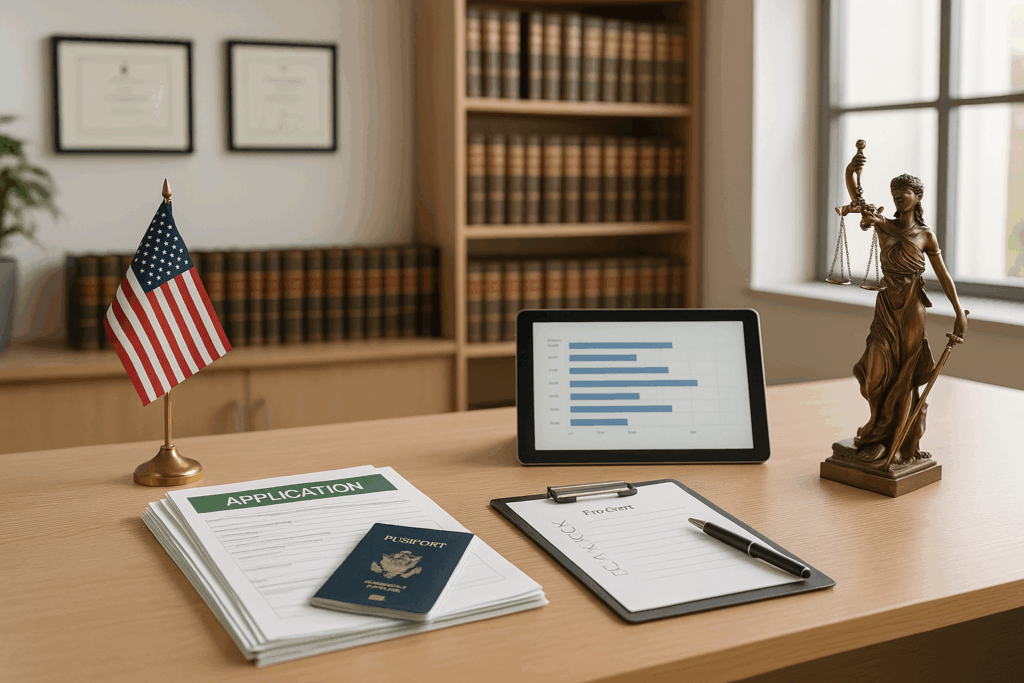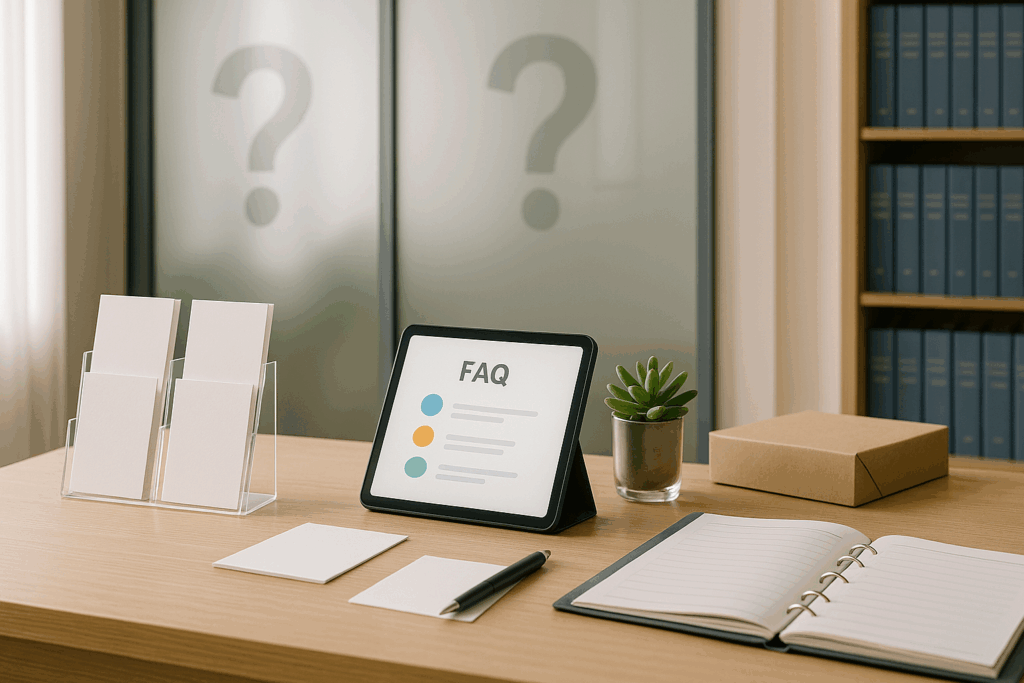Navigating U.S. immigration law requires strategic expertise, attention to detail, and unwavering commitment to your success.
When it comes to L1 visa applications, the stakes are high for multinational companies and key employees seeking to establish or expand U.S. operations. An experienced immigration lawyer specializing in L1 visas can make the difference between approval and costly delays that could derail your business objectives.
The L1 visa serves as a critical pathway for intracompany transferees, allowing foreign companies to transfer valuable personnel to U.S. operations. However, the application process involves:
- intricate requirements
- extensive documentation
- precise legal compliance that can overwhelm even prepared applicants
This comprehensive guide will illuminate every aspect of the L1 visa process while demonstrating why professional legal representation is essential for achieving your immigration goals.
What are the Main 2 Types of L-1 Visas (& Their Purpose)?
The L1 visa category facilitates the transfer of key employees within multinational companies, enabling businesses to leverage human capital across international borders. This nonimmigrant visa allows foreign companies to relocate essential personnel to their U.S. subsidiary, branch office, affiliate, or parent company operations.
The visa recognizes that successful business expansion often depends on transferring experienced executives, managers, and specialized knowledge employees.
Understanding the distinct L1 visa categories is crucial for determining eligibility and application strategy:
- L-1A: Reserved for executives and managers continuing in leadership roles within the U.S. organization, with initial validity up to three years for established companies and seven-year maximum stays.
- L-1B: Designed for employees with specialized knowledge of the company’s products, services, research, equipment, or processes, with initial three-year terms and five-year maximum duration.
- (Bonus) L-2: For spouses and unmarried children under 21 of L1 visa holders, providing dependent status that allows family accompaniment and enables spouse work authorization.
Breaking Down the L-1 Visa Application Process, Validity Term, & Requirements

An experienced L-1 visa lawyer can simplify transferring executives, managers, or specialized staff from a foreign branch to a U.S. office. The L-1 process is detailed, requiring proof of the company relationship and the employee’s qualifying role.
A skilled attorney helps prepare strong petitions, reduce errors, and avoid costly delays. Below, we outline the key steps, typical validity terms, and core requirements for securing an L-1 visa.
The Process:
The L1 visa application process begins with the U.S. petitioning company filing Form I-129 with USCIS, accompanied by comprehensive supporting documentation. The employer must demonstrate the qualifying relationship between foreign and U.S. entities and the employee’s eligibility based on their role and employment history.
Premium processing is available for an additional fee, reducing processing time to approximately 15 business days.
4 Validity Terms:
Initial L1 visa validity terms vary based on category and company circumstances:
- L-1A visas for established companies typically receive three-year initial periods, while new office petitions receive one-year terms requiring demonstration of successful business establishment for extensions.
- L-1B visas follow similar patterns but with shorter maximum stays of five years total compared to seven years for L-1A holders.
- L-1A holders must serve in executive or managerial capacity with authority over personnel or operations, while L-1B holders need specialized knowledge specific to company operations.
- L-1A visa holders can potentially transition to EB-1C green card categories without labor certification, whereas L-1B holders typically require labor certification.
- The maximum stay period differs significantly: L-1A allows seven years compared to L-1B’s five-year limit.
6 Requirements:
The comprehensive L1 visa requirements encompass multiple critical elements:
- Qualifying Relationship: U.S. and foreign companies must maintain parent-subsidiary, branch, or affiliate relationships with demonstrated common ownership or control.
- Employment: The beneficiary must have worked for the foreign entity continuously for at least one full year within three years immediately preceding petition filing.
- Capacity of Employment: The applicant’s foreign position must have been in executive, managerial, or specialized knowledge capacity corresponding to their intended U.S. role.
- Intended Nature of Transfer: The transfer must be temporary, though L1 holders may pursue permanent residency through dual intent provision.
- Qualifying Employment: The applicant’s prospective U.S. employment must be in a qualifying executive, managerial, or specialized knowledge position.
- Ongoing Business Operations: Both foreign and U.S. companies must be actively engaged in regular, systematic business operations throughout the visa validity period.
The 5 Types of Required Documents for an L-1 Visa (You Should Know)
Successfully obtaining an L1 visa requires meticulous documentation substantiating every petition aspect, from corporate relationships to individual qualifications.
The complexity often overwhelms applicants attempting the process without experienced legal representation. Immigration attorneys understand precisely which documents USCIS requires and how to present them compellingly to maximize approval chances.
-
Needed Documents for US Company
The U.S. petitioning company must provide comprehensive evidence of legal existence, business operations, and financial stability.
- Articles of incorporation, corporate bylaws, and business licenses establish legitimate formation and operational authority.
- Financial statements, tax returns, and bank records demonstrate economic viability and ability to support the transferred employee’s compensation.
-
Needed Documents for US Job
Detailed job descriptions, organizational charts, and position specifications must clearly articulate the executive, managerial, or specialized knowledge nature of the proposed position.
- Documentation should demonstrate how the role fits within company hierarchy and contributes to business objectives.
- Salary information and employment contract terms provide additional context for the position’s organizational significance.
-
Documents for Applicant’s Foreign Employment
The applicant’s foreign employment history requires thorough documentation including employment contracts, pay stubs, tax filings, and performance evaluations covering the qualifying one-year period. Letters from supervisors should detail job responsibilities, reporting relationships, and contributions to company operations. This establishes the continuous employment requirement and demonstrates the qualifying nature of the foreign position.
-
Documents for Applicant’s Foreign Company
The foreign company must provide similar documentation to the U.S. entity, including corporate formation documents, business licenses, and financial records.
- Evidence of the qualifying relationship requires legal documentation such as stock ownership records, merger agreements, or corporate filings.
- Business promotional materials and contracts demonstrate legitimate commercial activities.
-
Documents Showing Applicant’s Background
Personal documentation includes passport, educational credentials, professional certifications, and detailed resume highlighting relevant experience.
- While L1 visas don’t require specific educational requirements, advanced degrees can strengthen petitions by demonstrating expertise and organizational value.
- Letters of recommendation can provide additional support for specialized knowledge claims.
Your L-1 Visa is Only 4 (Simple) Steps Away

The L1 visa process involves systematic steps requiring careful attention to timing, documentation, and fee obligations. Each step builds upon previous submissions, making early mistakes potentially costly in processing delays and legal fees. Understanding the complete process helps develop realistic timelines and appropriate budgeting.
- Filing
-
-
- Form I-129: The Petition for Nonimmigrant Worker serves as the primary application document, accompanied by the L Classification Supplement and all supporting evidence.
- Fees: Current USCIS filing fees include the base I-129 fee (which varies based on nonimmigrant classification & employer size) plus additional charges for premium processing if requested, with fee amounts subject to regular government adjustments.
-
- Documenting
-
-
- Qualifying Relationship: Submission of corporate documents, ownership records, and legal agreements that establish the required relationship between foreign and U.S. entities.
- Employee Eligibility: Comprehensive evidence package demonstrating the applicant’s qualifying employment history, job responsibilities, and proposed U.S. role specifications.
-
- Approval
-
-
- USCIS Processing: Standard processing typically requires 2-4 months, though premium processing reduces this timeframe to approximately 15 business days for expedited review.
- Interview and Issuance: Following petition approval, applicants outside the United States must attend visa interviews at U.S. consulates before receiving visa stamps for travel.
-
- Arrival & Status Maintenance
-
- Entry to the U.S: Successful entrants receive I-94 arrival records establishing their authorized stay period and L1 status within the United States.
- Extensions/Change of Status: Ongoing compliance requires timely extension applications before status expiration and proper maintenance of qualifying employment relationships.
Find an Attorney Who Advocates for You: Our L-1 Visa Success is Your Success

At Lightman Law Firm, our track record demonstrates our commitment to client success in L1 visa applications. Our experienced team has guided numerous multinational companies through successful L1 transfers, from Fortune 500 corporations to emerging businesses establishing their first U.S. presence.
Our comprehensive approach ensures that every aspect of your L1 petition receives the careful consideration necessary for approval. We work closely with both employers and employees to develop compelling cases that clearly demonstrate eligibility while anticipating and addressing potential USCIS concerns.
Why wait?
Contact us today to schedule a conversation towards making your U.S. business objectives a reality through efficient, effective legal representation.
These 8 Advantages of an L-1 Visa May Surprise You
The L1 visa offers unique benefits that make it an attractive option for multinational companies and their key employees seeking U.S. work authorization. Understanding these advantages helps businesses make informed decisions about their immigration strategies and employee transfer plans.
These 8 benefits often provide competitive advantages over other visa categories, making the L1 an essential tool for international business expansion.
- Intra-company Transfers
The L1 visa specifically facilitates seamless employee transfers within multinational corporations, allowing businesses to leverage existing talent and institutional knowledge across international operations. - Dual Intent
Unlike many nonimmigrant visa categories, L1 holders may simultaneously pursue permanent residency without jeopardizing their current status, providing flexibility for long-term career planning. - Family Inclusion
Spouses and unmarried children under 21 automatically qualify for L2 dependent status, enabling families to relocate together and maintain stability during the business transition. - No Annual Cap
The L1 category doesn’t impose numerical limitations like H-1B visas, eliminating the uncertainty associated with lottery systems and providing predictable application timelines. - Flexibility for New Offices
L1A visas specifically accommodate executives and managers establishing new U.S. offices, supporting business expansion initiatives with appropriate immigration solutions. - Extension Possibility
L-1A holders may extend their status up to seven years total, while L-1B holders can remain for up to five years, providing sufficient time for business development and family settlement. - Potentially Lead to More Favorable Green Card Category (L1-A)
L-1A visa holders may qualify for EB-1C permanent residency without labor certification requirements, significantly expediting the green card process compared to other employment-based categories. - L2 Dependents of L1 Visa Holders Can Work
L2 spouses can obtain work authorization independent of their employment category, providing additional income opportunities and career development options for families.
Know Before You Go: Here’s How to Renew an L-1 Visa

L1 visa renewals require comprehensive reapplication processes mirroring initial petition requirements, with USCIS treating each extension as a new eligibility determination. Applicants cannot rely on previous approval as automatic qualification, making thorough preparation essential. The renewal process demands updated documentation demonstrating:
- ongoing qualifying relationships
- sustained business operations
- and continued appropriate employment.
Government officials maintain no prior preference for renewal applications compared to initial petitions, emphasizing complete eligibility redetermination. Everything remains substantially the same as initial applications, except renewals are exempt from certain new office fees.
Successful renewal strategies focus on demonstrating business growth, sustained qualifying employment, and continued need for the employee’s specialized skills or leadership.
7 Benefits to Using Our Immigration Lawyers Instead of Going it Alone
Professional legal representation provides significant advantages over attempting L1 visa applications without experienced guidance. Many applicants underestimate the sophistication required for successful L1 petitions, leading to costly delays or denials.
Our immigration attorneys bring years of specialized experience ensuring applications meet the highest approval standards.
- Experience of the Lawyer: Our team possesses extensive experience handling L1 visas across diverse industries and company sizes.
- Personalized & More Responsive Service: Unlike high-volume immigration mills, we provide individualized attention to each client’s unique circumstances.
- Document Preparation and Review: Our meticulous approach eliminates common errors that frequently trigger USCIS requests for additional evidence.
- Strategic Planning: We help develop long-term immigration strategies aligning with business objectives and family goals.
- Legal Representation: From initial filing through USCIS correspondence and potential appeals, we provide comprehensive representation.
- Experience with Companies of All Types: Our diverse client base includes multinational corporations, emerging businesses, and specialized service providers.
- Specializing in Smaller Company Situations: We excel in representing smaller companies, including foreign entities with approximately 100 employees establishing initial U.S. presence.
19 FAQs to Consider When Searching for an L-1 Visa Lawyer

Understanding common questions and concerns about L1 visas helps applicants make informed decisions about their immigration strategies and legal representation needs.
These frequently asked questions reflect real-world concerns from our clients and provide practical insights into the L1 visa process. Addressing these questions upfront demonstrates our commitment to transparency and client education throughout the immigration journey.
- What exactly constitutes a managerial or executive role and what is specialized knowledge?
Managerial capacity involves overseeing organization functions, supervising professional staff, or managing essential business components with hiring authority. Executive roles encompass setting organizational goals, establishing policies, and exercising wide decision-making latitude. Specialized knowledge requires advanced expertise in company products, services, research, or processes that distinguishes the employee from others in similar positions. - What distinguishes an L-1A visa from an L-1B visa?
L-1A visas are for executives and managers with leadership responsibilities and decision-making authority. L-1B visas serve employees with specialized knowledge essential to company operations. L-1A holders enjoy longer maximum stays (seven years) and more favorable green card pathways. For more information, check out this article. - Who is eligible for an L-1A or L-1B visa in the U.S.?
Qualified employees must have worked continuously for the foreign company for at least one year within three years preceding their petition in executive, managerial, or specialized knowledge capacity. Companies must maintain qualifying corporate relationships as parent-subsidiary, branch, or affiliate entities.
- How long can I stay in the U.S. on an L-1 visa?
L-1A visa holders may remain up to seven years total, with initial three-year periods for established companies. L-1B holders are limited to five years maximum. Extensions are available in two-year increments until reaching category-specific maximums. - Can I apply for an L-1 visa if my company doesn’t have a U.S. office yet?
Yes, new office L1 petitions accommodate companies establishing initial U.S. operations, typically receiving one-year initial approval periods. Petitioners must demonstrate secured office space, business plan, and financial ability to commence operations. - Is there a minimum salary requirement for the L-1 visa?
No specific minimum salary requirement exists, though compensation should be commensurate with the executive, managerial, or specialized knowledge nature of the position. USCIS examines whether salary levels support claimed job responsibilities. - What documentation do I need for an L-1 visa?
Comprehensive documentation includes corporate formation documents for both entities, evidence of qualifying relationships, detailed job descriptions, organizational charts, financial statements, employee work history, and proof of qualifying employment. - What is the process for obtaining an L-1A or L-1B visa?
The process begins with Form I-129 filing by the U.S. employer, accompanied by supporting documentation and fees. Following USCIS approval, applicants outside the U.S. must attend consular interviews for visa issuance. - What are the U.S. Citizenship and Immigration Services (USCIS) filing fees?
Current USCIS filing fees include the base I-129 petition fee, with additional charges for premium processing, fraud prevention, and American Competitiveness fees depending on company size and circumstances. Fee amounts change regularly based on government adjustments, making current fee verification essential before filing. Additional consular processing fees apply for applicants seeking visa stamps at U.S. embassies or consulates abroad. - What are typical attorney fees to petition for an L-1A or L-1B visa?
Legal fees vary based on case complexity, company size, and documentation requirements. Our firm provides transparent fee structures during initial consultations for appropriate budgeting. - Can my L-1 visa application be expedited?
USCIS offers premium processing for L1 petitions, guaranteeing response within 15 business days for an additional fee, though this doesn’t guarantee approval outcomes. - How many employees can an employer sponsor under L-1 visas?
No numerical limit exists for L1 visa petitions, though USCIS applies reasonableness standards based on company size and legitimate business needs. - What are the responsibilities of an employer that sponsors an L-1 visa?
Petitioning employers must maintain qualifying corporate relationships, continue legitimate business operations, ensure employees work in authorized capacities, and comply with immigration reporting requirements. - Are dependents of L-1 visa holders allowed to work in the U.S.?
L2 spouses may obtain employment authorization documents allowing unrestricted U.S. work. L2 children cannot obtain work authorization but may attend school. - Can my family members obtain status if I’m applying for an L-1 visa?
Spouses and unmarried children under 21 automatically qualify for L2 dependent status, allowing families to relocate together with status periods matching the primary L1 holder’s authorized stay. - Can I travel outside the U.S. while on an L-1 visa?
L1 visa holders may travel internationally and return provided they have a valid L-1 visa and are maintaining a valid status, possess appropriate documentation, and continue qualifying employment relationships. - What happens if my role or job duties change while I am on an L-1 visa?
Material changes in job responsibilities or employment terms may require amended petitions to maintain lawful status. Minor adjustments within the same job category typically don’t trigger amendment requirements. - What happens if my L-1 visa application is denied?
Denial outcomes depend on current immigration status, with properly maintained nonimmigrant status generally continuing until expiration. Prompt legal consultation following denials is essential for exploring available remedies.
- How does the L-1 visa lead to a Green Card?
L-1A holders may qualify for EB-1C permanent residency without labor certification, significantly expediting the green card process. L-1B holders typically require labor certification through PERM processes before advancing to permanent residency categories.
To Hire a L-1 Visa Lawyer or Not? The Choice is Clear

The complexity of L1 visa applications demands experienced legal guidance that only specialized immigration attorneys can provide. Attempting to navigate intricate requirements without professional representation significantly increases the risk of costly delays or denials that could derail business objectives.
At Lightman Law Firm, we understand that your success depends on efficient, effective immigration solutions that align with your strategic goals.
Our commitment to clear-headed, creative immigration advocacy ensures that your L1 visa application receives the strategic attention and meticulous preparation necessary for approval. We combine legal expertise with modern technology and personal attention to guide you through every step of the process.
Don’t leave your business expansion plans to chance.
Contact us at Lightman Law today to discover how our experienced team can transform your L1 visa goals into reality without surprise, delay, or compromise.